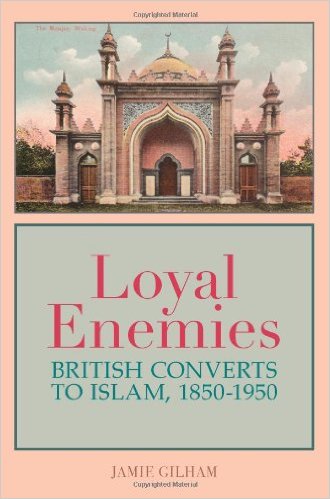
Loyal Enemies: British Converts to Islam, 1850 – 1950. By Jamie Gilham. London: Hurst and Company. Pp. 333. 2014. HB. £20.
The author of this book is a historian who obtained his doctorate from the University of London and specialises in the history and politics of British Islam. He is currently an Honorary Research Associate in the Department of History at Royal Holloway, London University and has published several essays and articles on aspects of British Muslim history and politics. The book under review may originally have been a part of his doctoral dissertation.
When writing about British Islam, most historians tend to focus on the post-War period, specifically highlighting the decades that witnessed the mass influx of Muslims to the UK from the Indo-Pak subcontinent and parts of Africa and the Middle East. By contrast, in this book, the author seeks to ‘uncover the history and lives of the first Britons to freely convert to Islam and live as Muslims on British soil.
It considers individuals and communities connected by their conversion and commitment to Islam in the century before the onset of mass immigration from Britain’s former colonies.’ (p1)
The book consists of an introduction, six chapters and an epilogue, providing an overview of the history of British Muslim community focusing mainly on the lives and activities of prominent English reverts. Thus chapter one explores the life and career of Henry Edward John Stanley of Alderley (1827–1903), the first Muslim member of the House of Lords, who hailed from an aristocratic English family and played a notable role as a loyal citizen of this country as well as being a committed Muslim. How did he manage to reconcile the two roles?
According to the author of this book, ‘Stanley’s commitment to Islam set the tone for subsequent generations of converts – it was practical and pragmatic, adapted to the circumstances of living in a non-Muslim country, and thereby necessitated compromise and negotiation…Stanley’s Britishness and continued respect for Christianity syncretised with his new faith and Muslim sensibility.’ (p48)
Despite acknowledging Stanley’s openness, moderation and pragmatism as a British Muslim, the author, for some strange and inexplicable reason, followed Anne Fremantle’s example by referring to the early British reverts to Islam as ‘loyal enemies’. Was it not possible to be a loyal British citizen as well as a committed Muslim at the time? For Christians, it seemed, yes! For Jews, it seemed, yes! For Hindus, it seemed, yes! For Muslims, it was clearly no! Why?
Admittedly, there are no straight forward answers to this question. That is very much illustrated by the life and career of William Henry Quilliam (1856 –1932), better known as Abdullah Quilliam, who was perhaps the most prominent Englishman to embrace Islam during the Victorian times and he went onto establish Britain’s first mosque and Islamic centre in Liverpool, having attracted hundreds of British reverts. Chapters two and three of this book provide a detailed but less favourable overview of the life and works of this influential British Muslim. Unlike Stanley, Quilliam was not an establishment figure, whose understanding of Islam was practical as well as internationalist, who not only openly espoused his faith but also developed close links with Ottoman Turkey.
He was of course critical of aspects of British policy vis-à-vis the Ottomans but that in itself surely could not have been interpreted as being disloyal. But, then again, he lived during an unusually testing and turbulent times, and reconciling the demands of his faith and loyalty to the nation was far from being straight forward or easy at the time.
That is why the British Muslims of the time ‘who wielded their pens to protest against Britain’s foreign policy tended to be individuals scattered across Britain and abroad…and whose conversion to Islam might even have been politically motivated. Like Quilliam, they generally supported the pre-existing British Empire, were particularly concerned about their government’s interference in the Ottoman Empire and its repercussions in India and, thus, argued that they had the best interests of Britain in mind.’ (p115)
Needless to say, the British establishment did not, at the time, see things in that way and many of them were wrongly perceived to be disloyal, if not subversive. That was clearly the case with Muhammad Marmaduke Pickthall (1875 –1936) whose extraordinary life and fruitful career is, strangely enough, not given the coverage it deserved in this book. The author summarised his life and contribution in just over 3 pages!
Chapters four and five of this book are very useful as they provide an overview of the lives and activities of numerous other British Muslims, reverts and immigrants, who played an active role in their communities during the first half of the twentieth century, while in the last chapter the author explores the issue of faith, identities, allegiances and subsequent marginalisation of Muslim voices in Britain after the Second World War, at a time when the immigrants from the former British colonies started to arrive.
The author is right to say that the early Muslim reverts ‘continue to have relevance today because they navigated and demonstrated what it takes to be Muslim in a non-Muslim country. Although operating in a different historical context, their lives have obvious parallels with Muslims – converts and non-converts – in Britain now. Contemporary Muslims experience prejudice and discrimination; they also have to negotiate Islamic prohibitions, seek to adapt and indigenise their faith to make it consonant with living in the modern West; and continue to juggle sometimes conflicting, diverse national, cultural and religious identities and loyalties.’ (pp245-6)
This is a very useful and beautifully written book, and the author deserves credit for his efforts; students and scholars of modern British history will, no doubt, find it an interesting and informative contribution. It also contains extensive notes and bibliography; a useful resource for present and future researchers alike.
Muhammad Khan is currently writing a book on the Muslim heritage of the West (Kube Publishing, forthcoming 2016).